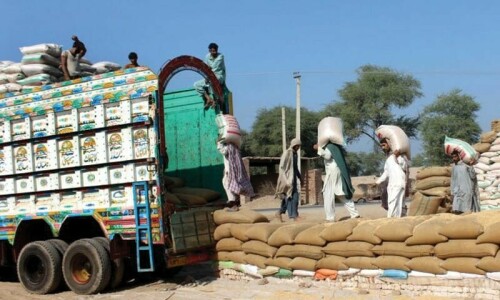FAISALABAD: Around 38 per cent area of Pakistan is a breeding ground for the desert locust and the entire country is under threat.
This was echoed at an awareness session on locustcontrol for the farming community held at the University of Agriculture Faisalabad (UAF).
Dr Sagheer of the UAF said 38pc of the country’s area (60pc in Balochistan, 25pc in Sindh and 15pc in Punjab) is a breeding ground for the desert locust, while the entire country is under the threat of an invasion if the insect is not contained.
Addressing the session, Pakistan Agricultural Research Council (PARC) Chairman Dr Muhammad Azeem urged agriculture scientists to come up with practical solutions to fight locusts.
He asked the scientists to take the farming community on board as without their proper participation no research and development in agriculture could bear results. There was a need to eradicate locusts at the initial three stages of their life before they became adults, he added.
Say 38pc of entire country is breeding ground for the insect
Dr Azeem asked the farming community to help out the institutions to identify locust breeding spots so that proper measures could be taken.
He said Cholistan and Tharparkar were breeding grounds for locusts where the farming community would be sensitised to wiping out locusts at the initial stage.
The government had launched an incentive scheme for the farming community to combat the threat, while climate change had played a role in moving the insect from desert to agricultural areas.
UAF Vice Chancellor Dr Muhammad Ashraf said efforts were under way by all government institutions to fight locusts. He said the university had set up alocustresearch cell under which work was being carried out on war footing. It had hit crops at such a huge level after 27 years.
He warned of an impending locustattack for which measures were needed.
Dr Masnsoorul Hassan, the chairman of UAF entomology department, said the university had launched research into the locustlife history, attacked areas, critical stages to hit for low pesticide, management techniques, potential threats, effects of climate change and mitigation strategies.
Dr Sohail Ahmad and Dr Ameer Rasul also spoke on the occasion.
Published in Dawn, July 5th, 2020












































Dear visitor, the comments section is undergoing an overhaul and will return soon.